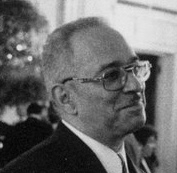A Quote by Benjamin Hart
Proponents of so-called pluralism feel compelled to ban religious considerations from public discourse because they know, instinctively if not intellectually, that their faith is in direct conflict with the God of the Bible, and that in the end the two positions are irreconcilable.
Related Quotes
There can be no religious discourse which is in conflict with its environment and with the world and therefore, we Muslims need to modify this religious discourse. And this has nothing to do with conviction and with religious beliefs, because those are immutable. But we need a new discourse that will be adapted to a new world and which will remove some of the misconceptions.
The term "globalization," like most terms of public discourse, has two meanings: its literal meaning, and a technical sense used for doctrinal purposes. In its literal sense, "globalization" means international integration. Its strongest proponents since its origins have been the workers movements and the left , which is why unions are called "internationals", and the strongest proponents today are those who meet annually in the World Social Forum and its many regional offshoots.
There are two views of interpreting the Bible in America: that every word is literally the truth without qualification, and then the other view is, it's called plenary inspiration, which holds that all religious truth taught in the Bible is true from God, but each word is not necessarily interpreted literally.
Faith in public life does not mean that God tells you to bomb another country or to go get Saddam Hussein. Faith in public life means that every child, regardless of their religious belief, should have health care and be able to go to school. Because my faith saying I can bomb Iraq is the same as your faith saying you can take over a passenger plane and fly it into the World Trade Center.
Faith, as the Bible teaches it, is faith in God coming against everything that contradicts Him- a faith that says, “I will remain true to God’s character whatever He may do.” The highest and the greatest expression of faith in the whole Bible is- “Though He slay me, yet will I trust Him” (Job 13:15).
I happen to be a scientist. My background is in nuclear physics. I was a nuclear engineer. But I don't see any incompatibility at all with my religious faith and God the creator of everything and the incompatibility between when the earth was created as specified in the Bible. I don't see any incompatibility there because those that were interpreting God's overall message didn't know anything about modern-day science.
Faith, then, generically, is confidence in a personal being. Specifically, religious faith is confidence in God, in every respect and office in which He reveals Himself. As that love of which God is the object is religious love, so that confidence in Him as a Father, a Moral Governor, a Redeemer, a Sanctifier, in all the modes of His manifestation, by which we believe whatever He says because He says it, and commit ourselves and all our interests cheerfully and entirely into His hands, is religious faith.
Reading the Bible is the fast track to atheism. Reading the Bible means starting at "In the beginning..." and throwing it down with disgust at "...the grace of the lord Jesus be with all. Amen." I'm sure there are lots of religious people who've read the Bible from start to finish and kept their faith, but in my self-selected sample, all the people I know who have done that are atheists.
Every production is by faith, every single one. You can't do it unless you have faith because one, you never know if it's going to work, and two, if you aren't compelled and you aren't passionate, then you can't convince the studio to give you millions of dollars to make a movie and then spend millions more to market it.
Faith is a great thing, and really religious people would like us to believe that faith and knowing are the same thing, but I don't believe that myself. Because there are too many different ideas on the subject. What we know is this: When we die, one of two things happens. Either our souls and thoughts somehow survive the experience of dying or they don't. If they do, that opens up every possibility you could think of. If they don't, it's just blotto. The end.




































